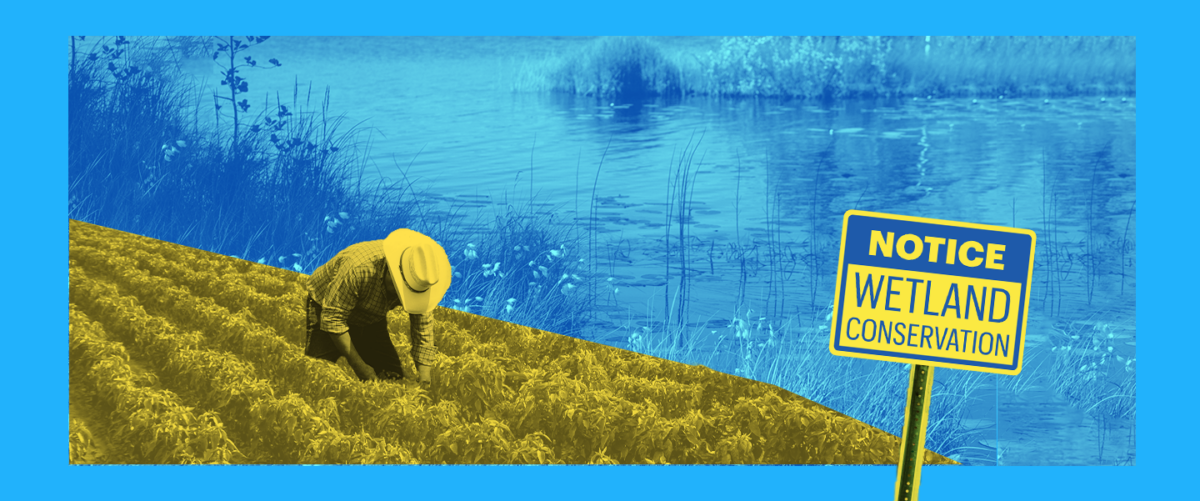Sustainable Farmers Fight Right-Wing Schemes to Gut Swampbuster
Published Nov 26, 2024

Food & Water Watch and allies support farmers in fighting Project 2025 efforts to end longstanding wetlands protections.
For forty years, U.S. farmers have counted on U.S. Department of Agriculture (USDA) conservation programs like the Swampbuster program to reward good land stewardship practices. Now, thanks to a politically motivated lawsuit, many sustainable farmers fear these programs are in jeopardy.
The case, CTM Holdings, LLC v. U.S. Department of Agriculture, is an absentee landowner’s attempt to convince a court that Swampbuster is unconstitutional. This tactic is a page straight out of Project 2025, the ultra-conservative playbook for the upcoming Trump presidency. Project 2025 also explicitly advocates for the end of Swampbuster and Sodbuster.
The Heritage Foundation and other extremist organizations behind Project 2025 believe USDA should not concern itself with incentivizing commonsense land management practices on the millions of acres within the agency’s regulatory purview. But many farmers disagree.
Swampbuster’s Environmental and Economic Benefits for Farmers
USDA’s Swampbuster program and its sibling program Sodbuster allow farmers to access certain pools of federal funding when they commit to sustainable practices. Swampbuster rewards farmers who conserve wetlands while Sodbuster rewards farmers who plant stabilizing grasses instead of commodity crops in soils at high risk of eroding into waterways.
Wetlands provide ecosystem services like pollutant filtration, wildlife habitat, and flood and drought mitigation that benefit farmers and other rural residents. Both programs have been extremely successful. Sodbuster is credited with preventing 295 million tons of soil erosion between 1982 and 1997, and Swampbuster currently protects approximately 78 million acres of wetlands. That’s approximately three-quarters of the wetlands left in the continental United States.
Many farmers also believe the programs help stabilize crop prices by preventing excessive planting. When crop prices are low, land managers may be tempted to plant every acre within their control to make up for lost profits, without regard for sustainability.
Programs that reward planting less, like Swampbuster and other conservation programs, help prevent the treadmill of low prices driving more planting, which leads to even lower prices. Avoiding this treadmill allows family farmers to better predict their income and earn a decent living for generations to come.
That’s why a group of farmers and their families represented by Food & Water Watch, the Environmental Law and Policy Center, and Iowa Environmental Council have moved to intervene in CTM Holdings, LLC v. U.S. Department of Agriculture in the U.S. District Court for the Northern District of Iowa. If granted, our intervention would give farmers a voice in a case that directly impacts their livelihoods.
Get the latest on our legal work and all our fights for food, water, and climate!
Efforts Against Swampbuster Are Part of a Larger Anti-Government Movement
The case against Swampbuster is part of a wider trend of legal action attempting to defang government agencies, particularly their ability to protect our environment.
Our coalition faces opposition from the Pacific Legal Foundation, a libertarian-leaning organization. Pacific represents both the plaintiff in CTM Holdings and another plaintiff in a similar case now pending before the Eighth Circuit Court of Appeals.
That case was recently brought back before the Supreme Court in the wake of its decision to overturn Chevron deference. The end of Chevron deference was a break in decades of precedent by the Supreme Court’s extremist right-wing majority, which believes the judiciary is more qualified to opine on highly technical questions than agencies full of subject matter experts.
Pacific Legal Foundation also represented the notoriously litigious plaintiff in Sackett v. EPA. This case led the Supreme Court to severely curtail Clean Water Act protections for wetlands.
This time, they’ll have to go through us.
We’ll Keep Fighting with Farmers for the Programs They Depend On
The plaintiffs in these ongoing cases are at a disadvantage — we have the law on our side. Multiple courts have already agreed that granting access to funding based on reasonable public policy goals is perfectly constitutional.
Moreover, granting our intervention motion just makes sense. Farmers deserve a seat at the table to defend the programs they and their communities have relied on for decades.
The government should be allowed to help farmers steward the land for future generations. This commonsense policy goal has been enshrined in USDA programs for almost a century. However, with Trump once again entering the White House, this is all under threat.
If Project 2025 and the President’s agenda succeed in gutting agencies’ power to regulate, they will clear the way for polluting corporate interests to run wild. But first, they will have to go through us.
Here at Food & Water Watch, we believe family farmers and the long-term sustainability of their land matter more than corporate profits. We can and will use the Constitution to fight back. Through the courts, we plan to safeguard agencies’ power until we have an administration that agrees sustainable farmers are worth protecting.
Enjoyed this article?
Sign up for updates.
TO TOP


